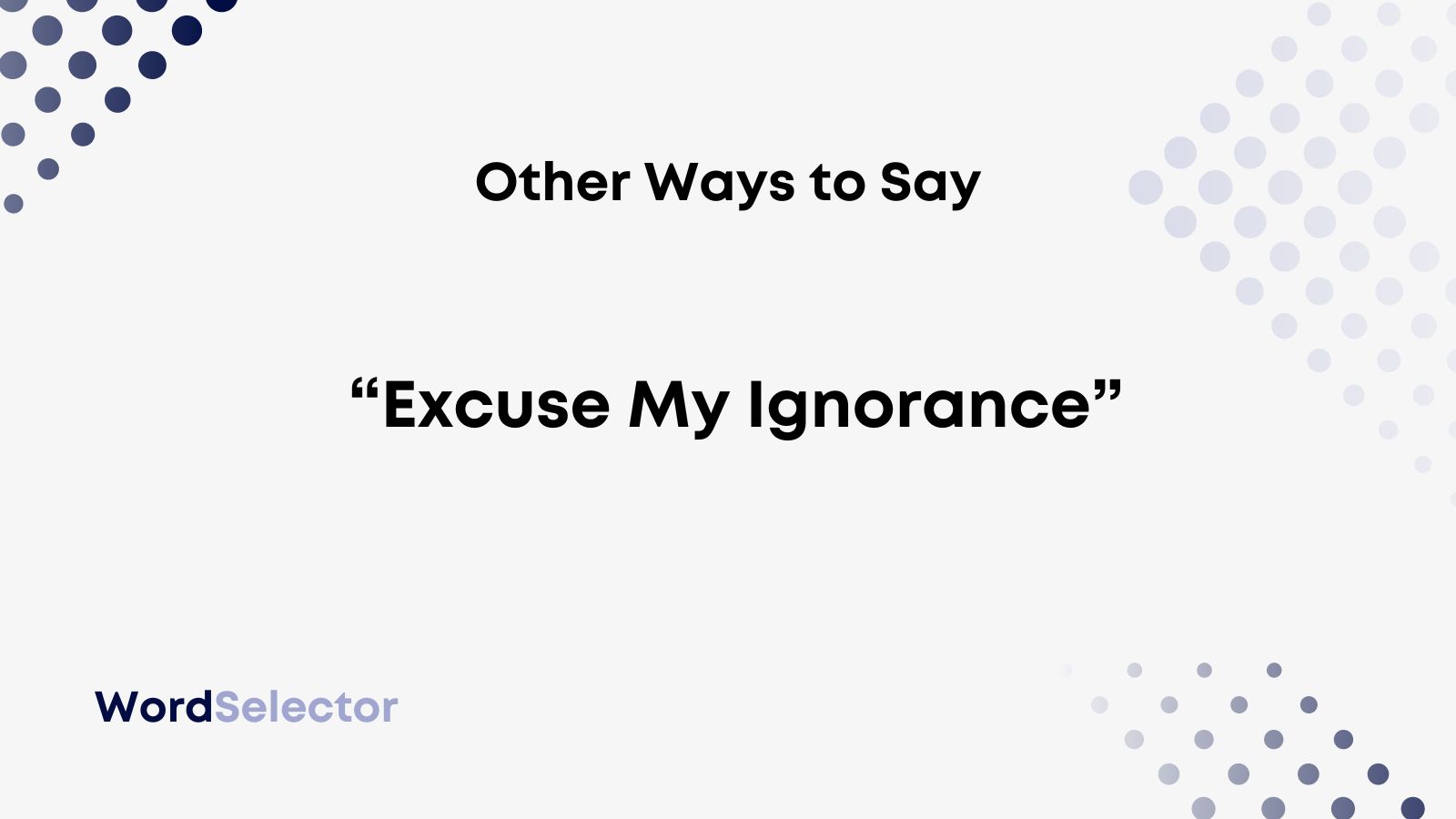It’s embarrassing not to know something when presented with new information. So, it’s reasonable to want to apologize for your lack of understanding.
“Excuse my ignorance” is one way to do this, but is it the most effective?
This article has gathered some great alternatives to show you how to say “excuse my ignorance” in an email without being embarrassed.
Other Ways to Say “Excuse My Ignorance”
- I apologize for not already being aware
- I’m sorry that I do not know about this
- Excuse my lack of understanding
- Sorry for my ignorance
- Please forgive my ignorance
- Please pardon my ignorance
- Pardon my indulgence
- Pardon my lack of knowledge
- Apologies for my lack of understanding
- Forgive me for my unawareness
- I apologize for my lack of familiarity
KEY TAKEAWAYS
- “Excuse my ignorance” works really well in formal emails when you don’t know certain information.
- You can say “I apologize for not already being aware” in more formal cases to sound as respectful as possible.
- Try “I’m sorry that I do not know about this” as a more apologetic and informal alternative.
So, read on to learn a better way of saying “excuse my ignorance.” We’ve touched on the best formal and informal options to help you spice things up.
The final section also covers whether it’s correct to write “excuse my ignorance.” Feel free to skip ahead to learn more about that.
I Apologize for Not Already Being Aware (Formal)
Another way to say “excuse my ignorance” is “I apologize for not already being aware.” It’s incredibly suitable in most formal instances, making it great for any email you write.
We recommend using this when emailing your boss. It shows you’re ignorant of a situation, usually because you weren’t paying attention or simply weren’t updated.
This is a good way to own your mistake. It shows you should know already, but you simply do not have it. So, you can use this to ask for someone to fill you in.
Starting the phrase with “I apologize” shows you’re sorry for being annoying. It implies that you think you’re a nuisance for not knowing the situation better than you do.
That’s why it works best when emailing your boss. It’s professional and respectful, but it also shows you take responsibility for not being more knowledgeable.
It’s also worth reviewing this sample email:
Dear Miss Sprock,
I apologize for not already being aware, but could you fill me in on the changes? I would appreciate any information.
Best regards,
Ben Frederickson
I’m Sorry That I Do Not Know About This (Informal)
It’s also worth using a slightly more informal phrase in your emails. Of course, this depends on the recipient. But we want to help you spice up your writing regardless of the tone.
So, for a conversational alternative, try “I’m sorry that I do not know about this.”
It shows you take responsibility for not knowing something. It’s also quite a friendly and apologetic way to show that you regret not having information already.
We recommend using it when emailing a coworker. It shows you’d appreciate it if they could provide you with any information that may help you to fill in some gaps.
It’s certainly a reasonable way to apologize for your ignorance. But we don’t recommend using it when you’re not familiar with the recipient (i.e., new clients or employers).
Here’s a helpful email example to show you how to use it:
Hi Jacqui,
I’m sorry that I do not know about this, but I would really appreciate your input. What can you tell me about the situation?
All the best,
Simon Wood
Is It Correct to Say “Excuse My Ignorance”?
It is correct to say “excuse my ignorance.” It works well in formal emails when you don’t know something about what the recipient is telling you.
For instance, you can let your boss know you don’t know the protocols they’re referring to. It shows you apologize for not being more aware, but you’d appreciate it if they could fill you in now.
Here’s an example to show you how to use “excuse my ignorance” in a sentence:
Dear Mr. Scott,
Excuse my ignorance, but what protocols are you talking about? I’m afraid nobody has told me about them before.
All the best,
Greg Johnson
It is not rude. If anything, it’s a polite way to own your mistakes and show that you do not know something.
You can also refer to this extension to mix things up:
- Please excuse my ignorance
If you’re worried about the phrase being rude, adding “please” is a surefire way to make it polite. There will be no confusion with how polite you’re trying to be when including it.
Also, this variation is correct and acceptable:
- Please excuse me for my ignorance
You can add “me for” in the middle of the phrase. It makes it sound more responsible and shows you take responsibility for not knowing something already.

